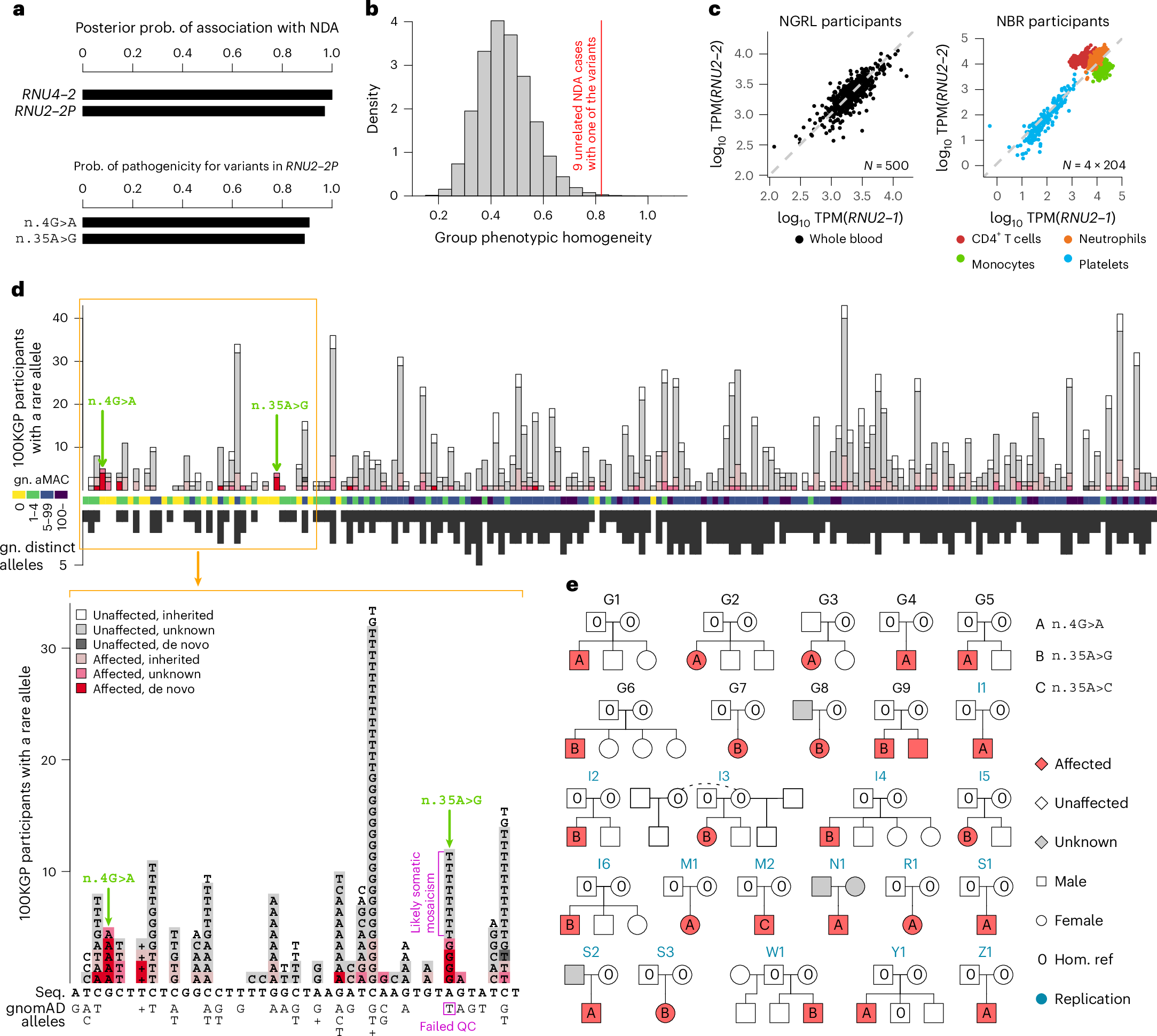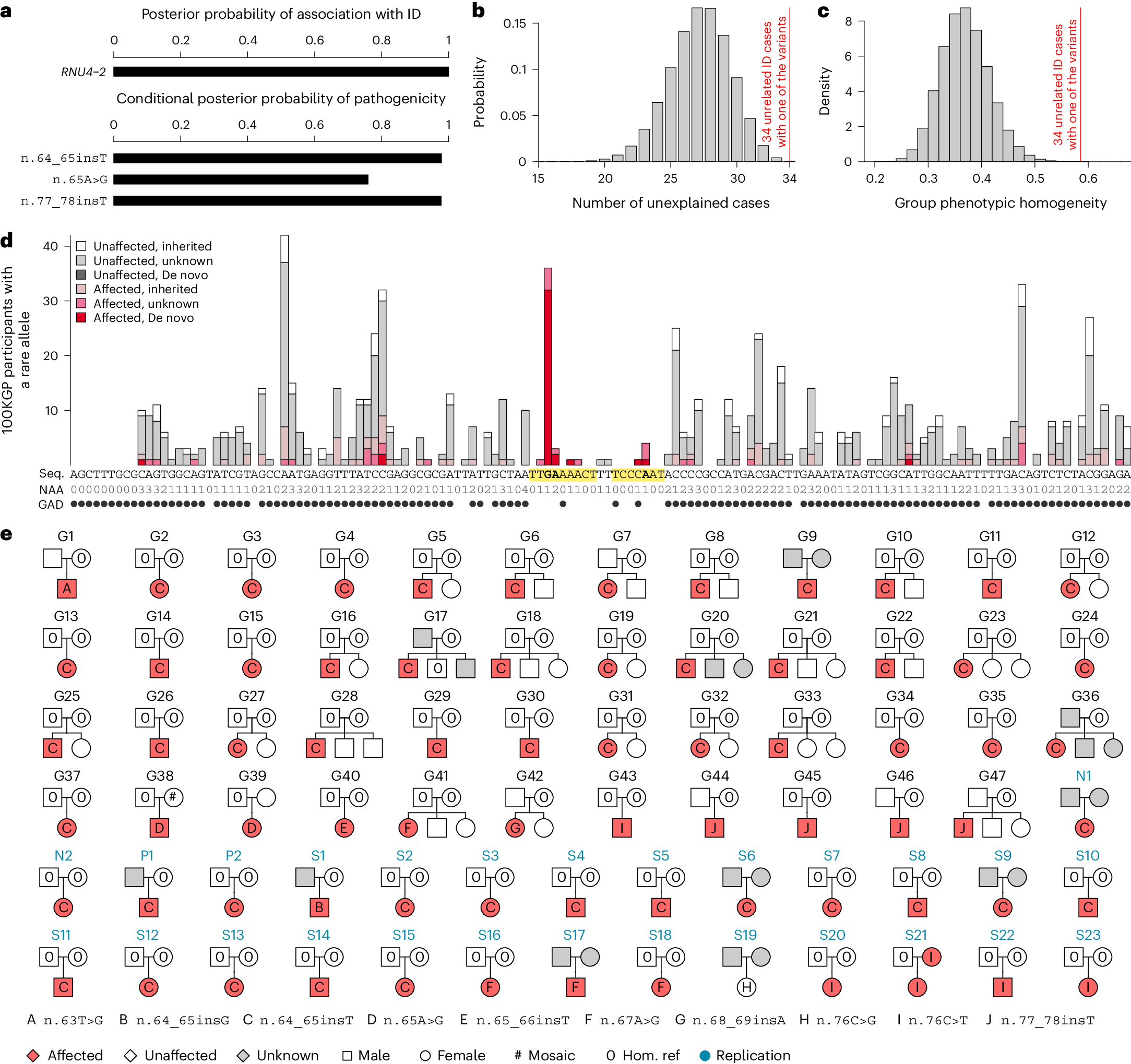2025-04-10 マウントサイナイ医療システム(MSHS)
<関連情報>
- https://www.mountsinai.org/about/newsroom/2025/landmark-study-identifies-new-genetic-cause-of-neurodevelopmental-disorders-bringing-long-awaited-answers-to-families
- https://www.nature.com/articles/s41588-025-02159-5
- https://www.nature.com/articles/s41591-024-03085-5
小核RNA遺伝子RNU2-2の変異がてんかんを伴う重篤な神経発達障害を引き起こす Mutations in the small nuclear RNA gene RNU2-2 cause a severe neurodevelopmental disorder with prominent epilepsy
Daniel Greene,Koenraad De Wispelaere,Jon Lees,Marta Codina-Solà,Brynjar O. Jensson,Emma Hales,Andrea Katrinecz,Esther Nieto Molina,Sonia Pascoal,Rolph Pfundt,Rachel Schot,Marta Sevilla Porras,Frank Sleutels,Irene Valenzuela,Robin Wijngaard,Ignacio Arroyo Carrera,Giles Atton,Didac Casas-Alba,Deirdre Donnelly,Anna Duat Rodríguez,Bárbara Fernández Garoz,Nicola Foulds,Deyanira García-Navas Núñez,Elena González Alguacil,… Ernest Turro
Nature Genetics Published:10 April 2025
DOI:https://doi.org/10.1038/s41588-025-02159-5

Abstract
The major spliceosome includes five small nuclear RNA (snRNAs), U1, U2, U4, U5 and U6, each of which is encoded by multiple genes. We recently showed that mutations in RNU4-2, the gene that encodes the U4-2 snRNA, cause one of the most prevalent monogenic neurodevelopmental disorders. Here, we report that recurrent germline mutations in RNU2-2 (previously known as pseudogene RNU2-2P), a 191-bp gene that encodes the U2-2 snRNA, are responsible for a related disorder. By genetic association, we identified recurrent de novo single-nucleotide mutations at nucleotide positions 4 and 35 of RNU2-2 in nine cases. We replicated this finding in 16 additional cases, bringing the total to 25. We estimate that RNU2-2 syndrome has a prevalence of ~20% that of RNU4-2 syndrome. The disorder is characterized by intellectual disability, autistic behavior, microcephaly, hypotonia, epilepsy and hyperventilation. All cases display a severe and complex seizure phenotype. We found that U2-2 and canonical U2-1 were similarly expressed in blood. Despite mutant U2-2 being expressed in patient blood samples, we found no evidence of missplicing. Our findings cement the role of major spliceosomal snRNAs in the etiologies of neurodevelopmental disorders.
U4 snRNA遺伝子RNU4-2の変異は、最も一般的な単発性神経発達障害の1つを引き起こす Mutations in the U4 snRNA gene RNU4-2 cause one of the most prevalent monogenic neurodevelopmental disorders
Daniel Greene,Chantal Thys,Ian R. Berry,Joanna Jarvis,Els Ortibus,Andrew D. Mumford,Kathleen Freson & Ernest Turro
Nature Medicine Published:31 May 2024
DOI:https://doi.org/10.1038/s41591-024-03085-5

Abstract
Most people with intellectual disability (ID) do not receive a molecular diagnosis following genetic testing. To identify new etiologies of ID, we performed a genetic association analysis comparing the burden of rare variants in 41,132 noncoding genes between 5,529 unrelated cases and 46,401 unrelated controls. RNU4-2, which encodes U4 small nuclear RNA, a critical component of the spliceosome, was the most strongly associated gene. We implicated de novo variants among 47 cases in two regions of RNU4-2 in the etiology of a syndrome characterized by ID, microcephaly, short stature, hypotonia, seizures and motor delay. We replicated this finding in three collections, bringing the number of unrelated cases to 73. Analysis of national genomic diagnostic data showed RNU4-2 to be a more common etiological gene for neurodevelopmental abnormality than any previously reported autosomal gene. Our findings add to the growing evidence of spliceosome dysfunction in the etiologies of neurological disorders.

